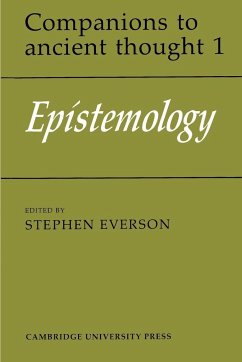
Epistemology
Versandkostenfrei!
Versandfertig in 1-2 Wochen
55,99 €
inkl. MwSt.

PAYBACK Punkte
28 °P sammeln!
In recent years philosophers have radically reappraised the importance and sophistication of the philosophical texts of the ancient world. This new series of Companions is intended particularly for students of ancient thought who will be reading the texts in translation but approaching them with the analytical skills of modern philosophy and with an eye to their contemporary as well as their historical significance. Each volume will be devoted to a specific field of philosophy and will contain discussions of relevant ideas of all the major philosophers and schools. The books will not attempt t...
In recent years philosophers have radically reappraised the importance and sophistication of the philosophical texts of the ancient world. This new series of Companions is intended particularly for students of ancient thought who will be reading the texts in translation but approaching them with the analytical skills of modern philosophy and with an eye to their contemporary as well as their historical significance. Each volume will be devoted to a specific field of philosophy and will contain discussions of relevant ideas of all the major philosophers and schools. The books will not attempt to provide a simplified conspectus of ancient views but rather critical discussions of the central and therefore representative arguments and theories. A particular feature of the series will be its exploration of post-Aristotelian philosophy, which has been shown by recent scholarship to be both philosophically exciting and historically important. This first Companion deals with Epistemology. The period from the sixth century B.C. to the second and third centuries A.D. was one of the most fertile for the theory of knowledge, and the range of 'epistemic states' explored in the ancient texts is much wider than those to be found in contemporary discussions of epistemology or cognition. Greek philosophers approached these problems in a great variety of ways, from the extreme relativism of Protagoras to the scepticism of the Pyrrhonists, and the contributors demonstrate both the familiarity and novelty of this range of views in their critical essays.














